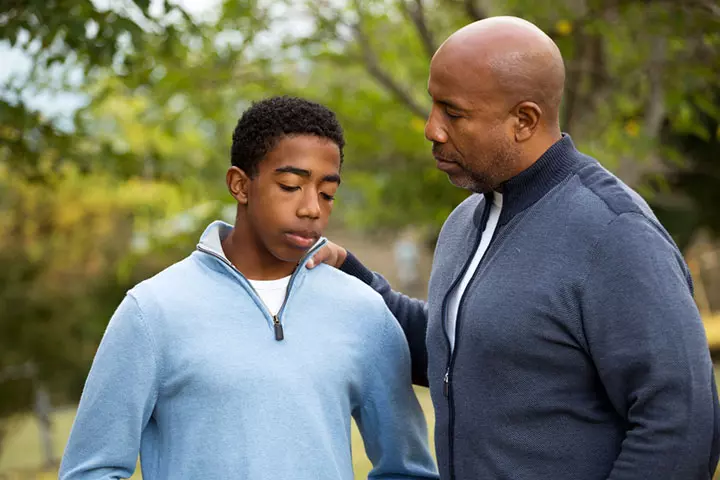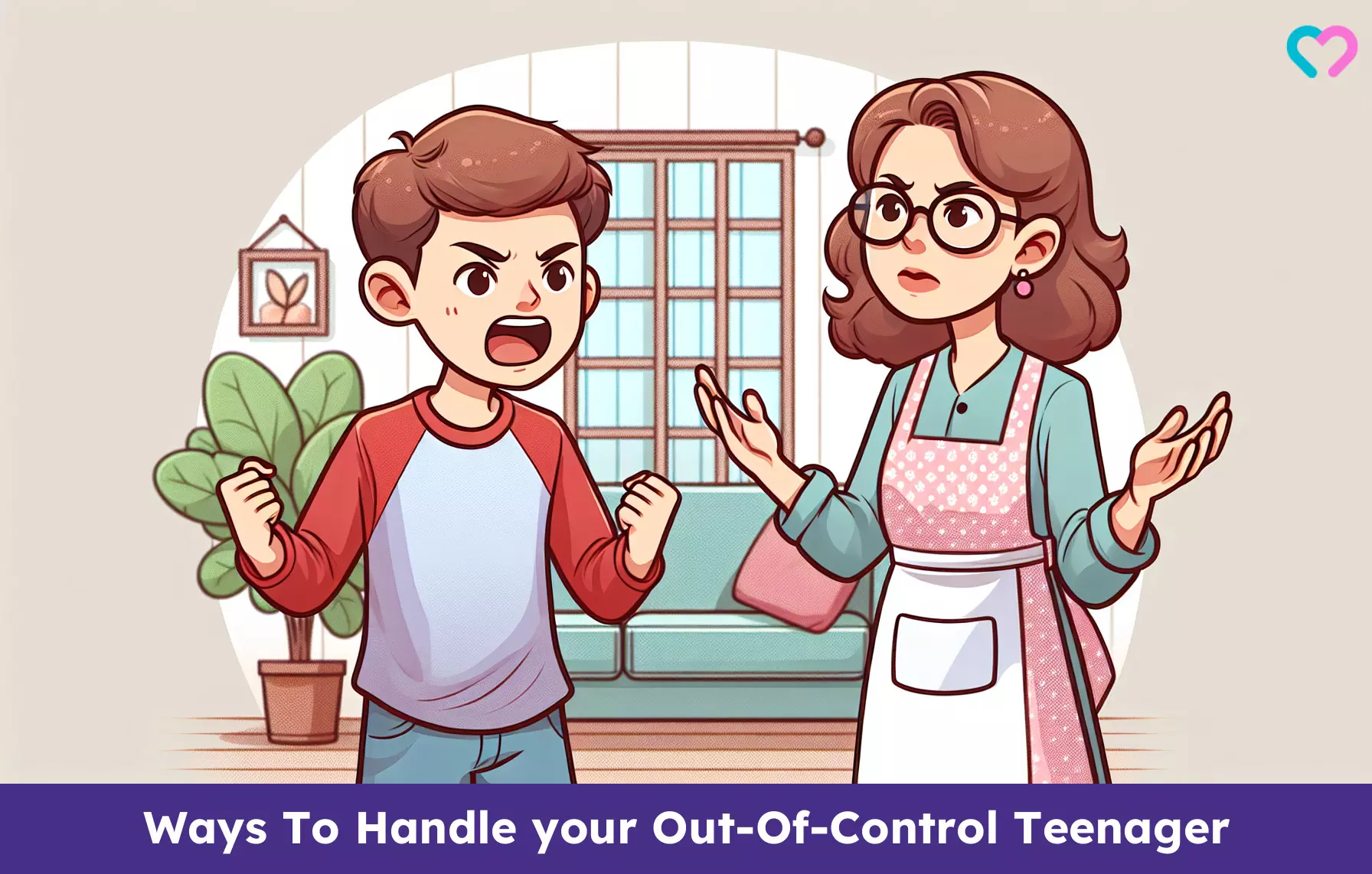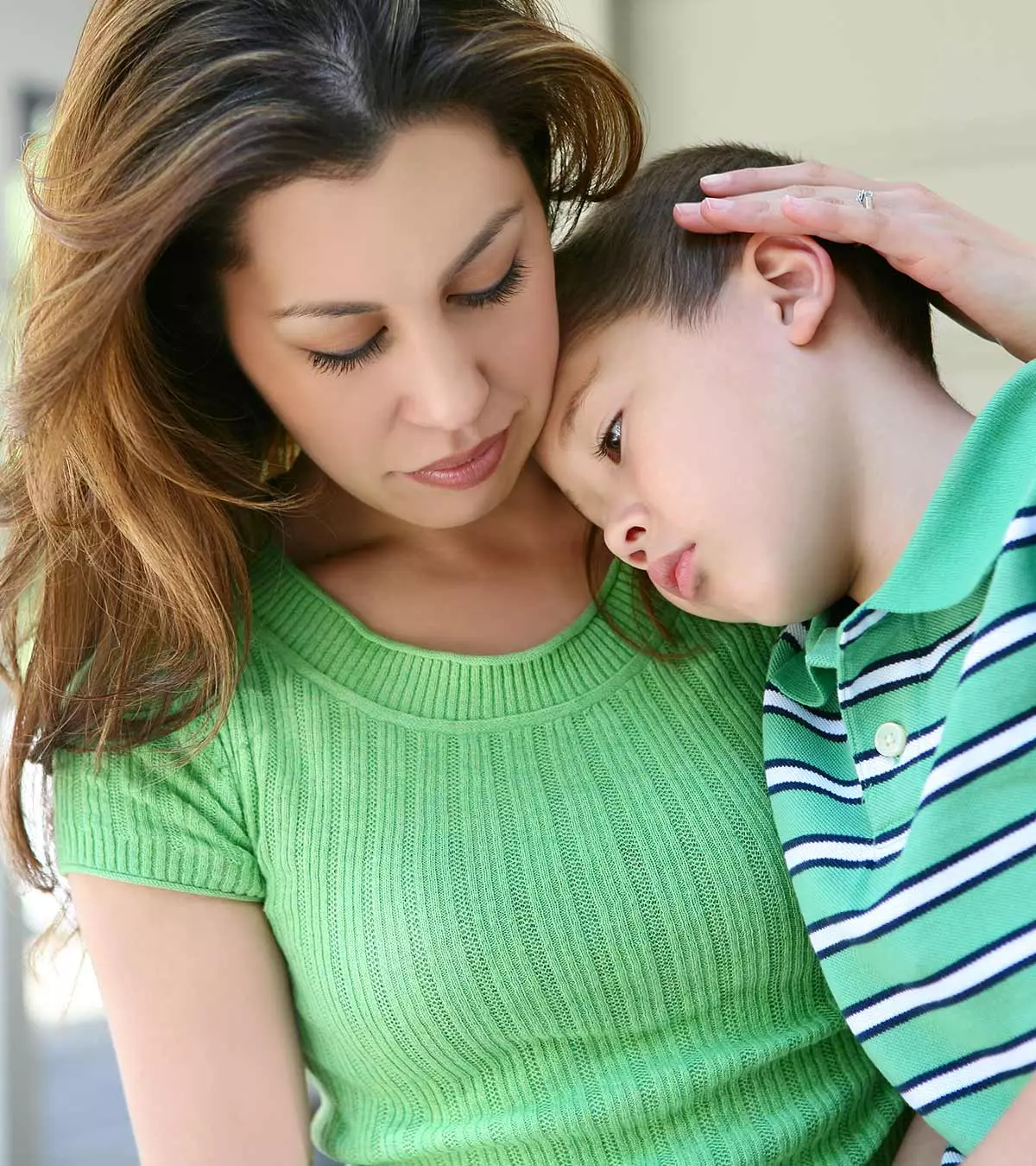
Image: Shutterstock
An out-of-control teenager may have emotional, behavioral, and learning issues that become more intense over time. Most troubled teens have a high probability of engaging in risky behaviors such as being in bad peer groups and using drugs or alcohol. Although most of them may experience behavioral changes and mood swings due to puberty, these are not uncontrollable or violent behaviors. At times, they may often escalate arguments and engage in violence at home and outside. Recognizing the signs of distress and dealing with such behavior can be challenging, but early intervention can help guide them toward healthier behaviors and relationships. Here is a guide to help you learn about out-of-control teen behavior and how to handle them.

Key Pointers
- Out-of-control teen behavior can include violence, substance abuse, breaking laws, self-destructive acts, and falling grades.
- Warning signs of out-of-control behavior are changes in appearance, appetite, sleep, negative friends, and lawbreaking.
- Physical and mental changes, peer pressure, and depression can cause out-of-control behavior, as well as underdeveloped impulse control.
- Parents can handle an out-of-control teen by reflecting on the situation, acting when necessary, and setting rules.
What is Out-Of-Control Teenage Behavior?
As a parent of a teenager, you must often wonder what’s normal and what is out-of-control when it comes to your teen’s behavior. You may be right with this line of thinking as teenagers are defiant and a moody bunch. You never know when and why they react in a certain situation (1).
Out-of-control conduct is not a fine line but a clearly-seen demarcation. But still, you may easily miss it or even dismiss your misbehaving teen as a totally normal event (2).
Normal Teen Behavior
Characterized by hormonal changes and brain development, teens normally tend to seek independence, privacy, and identity struggles (10). Pediatrician Rina Lazebnik states, “Every teenager is different and has a unique personality. Many adolescents struggle with their identity. It leads to behavior such as obsessing over their appearance, feeling awkward about their changing bodies, switching between being overconfident and having poor self-esteem, following friends’ examples in clothing and activities, finding fault with their parents, and reverting to childish behavior, such as slamming doors and crying (14).”

- Rebellious acts
- Mood swings
- Spending more time with friends than with family
- Angry outbursts
- Being secretive
Out-Of-Control Teen Behavior
- Falling/poor performance in school
- Violent acts (fights at school/home), extreme aggression
- Breaking laws
- Drug/alcohol abuse
- Self-destructive acts
 Do remember
Do rememberRed Flags
- Changes in appearance/appetite/sleep patterns/academic performance
- Depression/unexplained physical injuries/mood swings/irritability
- New set of friends that lead to negative behavioral patterns in your teen
- Excessive isolation/aloofness/excessive internet use or gaming
- Repeatedly breaking laws
Possible Reasons For Out-Of-Control Teenager’s Behavior
From physiological and psychological changes to environmental or situational factors, there can be any number of reasons for an out-of-control teen’s behavior (4). But here are the major factors that make teenagers recalcitrant:
- Teenagers go through a lot of physical and mental changes. All the cognitive changes along with hormonal flux can make teenagers moody and anxious. Your child can go through a state of confusion and succumb to teen peer pressure. These can lead your child to turn ungovernable and indulge in rebellious acts that can go out of control easily. Depression and other emotional changes can also lead your teen to experiment with drugs or alcohol(3) (4) (5).
- The adolescent brain goes through a lot of development. The cortex (the base of memories and thoughts) fully matures in the early 20s. The processes that help with impulse controls mature last. At this stage, teens are likely to experience tremendous mood swings that can lead to bad teenage behavior (6). This may be because teens do not have the tools to cope with emotionally overwhelming situations that challenge their decision-making and self-management skills (10).
Violence experienced by teenagers may cause health risks in them. The graph below compares the risks to youth who have faced violence in one or multiple forms. Here the color green indicates no violence, while gray, orange, and yellow represent one, two, and three plus types of violence, respectively. An increased exposure to violence has been shown to cause increased incidences of missed school, obesity, feelings of sadness or hopelessness, and suicidal thoughts or behavior.

Rates of Placental Abruption by Maternal Age
Source: Risk of Pregnancy Complications Also a Concern for Younger Patients Point to consider
Point to considerWays To Handle Your Out-Of-Control Teenager
Management of teenage behavior requires patience, empathy, resilience, and emotional stability. Parents need to have a strong trusting relationship with their children in order to be able to handle challenges and set boundaries without getting involved in heated arguments with their teenagers(10). Once the bond is established, you can deal with your out-of-control teenager with the help of several measures (7).
1. Face the mirror

Is it you or is it your teen? Did you contribute to your teen’s troubled behavior? What makes your teen behave the way he does all of a sudden? You may also be in denial about your teenager’s out-of-control behavior. But this may not help anyone in similar situations. So, it may help you to observe and reflect on the whole situation. Your teen will not turn wild and show this behavior all of a sudden. It happens over a period. A rebellious phase may turn into an out-of-control burst of anger that refuses to subside. You may have missed the signs, which are your teen’s cry for help. If you did, instead of wallowing in guilt, take action before your child does something that is life-threatening.
Pei-I Yang, a parenting and teen expert, agrees. She shares, “They (teenagers) are simply misunderstood and not difficult. I knew this not just because of my professional experience, but also because I was that rebellious teenager that drove my parents up the wall?? There were a lot of disharmonies in my home. My parents were really struggling with me and my behavior. I was a miserable teenager (i).”
Also, don’t be too hard on yourself. A child’s teen years are tough on parents too. Take a deep breath, toughen up and take action (8).
2. Find the answers
Have a heart-to-heart conversation with your troubled teenager. Even if he doesn’t share, chances are he is listening to you. How to deal with teenage attitude involves talking, not scolding or patronizing, and listening without judgment if they choose to open up. Talk, not scold or patronize him. And if they share, listen without judgment.
 Quick tip
Quick tip3. Know when to act
When to intervene and when to wait for any teen rebellion or rowdy behavior to phase out? Scenario A – Is your teen hanging out with friends who are loud/have poor hygiene but otherwise decent kids? Scenario B – Is your teen bunking school and hanging with kids who abuse alcohol/drugs/destruct properties? With scenario A, you can relax but may want to keep monitoring any changes in your teen. With B, you need to act fast and with some firm action. The trick is not to go by your preferences but by what keeps your kid safe and stops turning him into a delinquent.
4. Make rules

Parenting teenagers can be challenging, and maintaining discipline is even more difficult without established rules. Establish order in your house by implementing tough rules about schoolwork, household chores, dinner time, bad behavior, spending, etc. Add consequences to each action that doesn’t comply with these rules. Don’t become lax thinking your teen will hate you for it. Teens hate their parents in any case. So, if your teenager breaks a rule then let him know there are consequences he must face. For instance, overspending equals earning his next month’s pocket money through extra chores around the house. These actions will shake the obstinate views of your teen about different things.
5. Seek Help
Consider consulting a licensed therapist or a counselor specializing in adolescent behavior. They can provide strategies and support for you and your teen.
Teens who are unmanageable may be more willing to open up to a stranger than their parents. Also, don’t discount seeking help from family members. Teenagers are likely to be more open with an older sibling or even grandparents. Try all avenues for help (9).
Programs For Out-Of-Control Teenagers
Here are some programs you can try to help address your teen’s behavioral issues and provide a space to build skills essential for emotional resilience.
- Outpatient and day treatment programs: Teens can go for individual or group therapies wherein professional therapists can offer support and guidance. These facilities can be held in their schools or care centers.
- Residential care centers: These are care facilities for teenagers with emotional and behavioral challenges. They are provided with a safe and supportive environment to get exposure to various activities to develop their resilience, problem-solving, and communication skills.
In this context, Yang adds, “My parents did everything that was available to help me. They spoke to friends and family for advice; they put strict boundaries in place; they tried to talk to me and they spoke to school teachers. It was a challenging 6 years for me, my parents and my family.”
Frequently Asked Questions
1. Why is my teenager out of control?
Teens may have intense emotions and may not know how to express their feelings. They can be sensitive and self-conscious and often experience overwhelming emotions that make them disobedient and argumentative with parents and others. Stressful or worrying life events could make them have behavioral issues. Lack of sleep, mental health issues, and an unhealthy diet can cause unruly behavior in teens (10).
2. Can I kick my teenager out?
You cannot kick out or abandon your minor teen, even though they are disrespectful, harmful, or incorrigible. You may seek help from legal authorities to send them to residential care homes or foster care in the worst scenarios. Parents have the right to send their teen above 18 years out of the house in case of challenging behaviors. However, it is always advisable to find a solution for your teen’s problems (11).
3. What do you do when you can’t cope with your child?
You may give a break when it is difficult to cope with parenting. Seek support from friends, family, or support groups to help cope with parenting. Enlisting a counselor’s help if required is also a good idea. You may also seek support from children’s care centers if your child has challenging behaviors (12).
4. Under what circumstances can a child be taken into care?
There are various reasons for which a child is taken into care. Abandonment or death of a parent and neglect or abuse in the household can be reasons for sending a child to care. Children with substance abuse problems can also be sent to care. The decision to send care is always taken if it is the best option to ensure the child’s safety and care (13).
5. What role does communication play in managing an out-of-control teenager?
Communication plays a crucial role in managing an undisciplined teenager. By establishing clear and consistent communication, parents or guardians can effectively express their concerns and expectations while listening to the teenager’s perspective. It is important to communicate in a non-judgmental and supportive manner, allowing the teenager to feel heard and understood.
6. How can I improve communication with my teenager?
Active listening, showing empathy, and maintaining a non-judgmental stance can help improve communication with your teenager. You can also create a safe space where they feel comfortable sharing their feelings and experiences. Also, ensure regular check-ins about their day to build trust and openness.
7. What is the impact of an out-of-control teenager’s behavior on the family?
An out-of-control teenager’s behavior can have a significant impact on the family. The constant arguing, defiance, and disregard for rules can cause stress, tension, and frustration among family members. It can also lead to a breakdown in communication, making it difficult to establish trust and maintain healthy relationships.
8. How can parents or caregivers manage their emotions when dealing with an out-of-control teenager?
Parents or caregivers can manage their emotions when dealing with an out-of-control teenager by taking a step back and practicing self-regulation techniques. This may include deep breathing, taking a break, or physical exercise to release pent-up tension. It’s also important to communicate with the teenager in a calm and empathetic manner, validating their emotions and avoiding escalating the situation.
Infographic: What Not To Say To Your Difficult Teenager
There may be different reasons that can cause teenagers to get out of control. It may lead them to act out in aggression and defiance. But, you must not escalate the situation by saying things you shouldn’t since they are sensitive at this point. Keep this infographic handy to understand and remember what not to say to your difficult teenager. Illustration: Momjunction Design Team
You may feel helpless while trying to handle an out-of-control teenager. Teenagers are vulnerable to negative influences and are highly unpredictable. Being secretive and headstrong is normal at this age but resorting to violence, substance abuse, or breaking laws is concerning. Look out for reasons such as peer pressure or online influence on the behavior of your teenager, and try opening gates for discussion. Being judgemental or asserting your opinions can do more harm than good. Set mutually agreed rules with consequences, ensure that your child is in good company without interfering with their privacy, and identify situations that require firm actions. Managing noncompliant teenagers can be taxing, but timely intervention and tailor-made solutions with a lot of patience can help your teen out of trouble.
What to do when your teenager is out of control? How do you deal with your kid’s out-of-control behavior? Please share some tips with other readers.
Illustration: Ways To Handle your Out-Of-Control Teenager

Image: Dalle E/MomJunction Design Team
Are you struggling to understand your out of control teenager? This video will help you gain insight into their behavior and how to handle it.
Personal Experience: Source
MomJunction articles include first-hand experiences to provide you with better insights through real-life narratives. Here are the sources of personal accounts referenced in this article.
i. How to parent a difficult teenager — unlock the secret in 90 days.https://medium.com/@enquiries_19728/how-to-parent-a-difficult-teenager-unlock-the-secret-in-90-days-9cd792934d4a
References
- Youth Risk Behavior Surveillance System (YRBSS).
https://www.cdc.gov/healthyyouth/data/yrbs/index.htm - Teen Behavior: What’s Typical and What Are Signs of a Problem?
https://www.columbiadoctors.org/health-library/article/teen-behavior-what-s-typical-what-are-signs-problem/ - Positive Parenting Tips: Young Teens (12–14 years old).
https://www.cdc.gov/child-development/positive-parenting-tips/young-teens-12-14-years.html?CDC_AAref_Val=https://www.cdc.gov/ncbddd/childdevelopment/positiveparenting/adolescence.html - Positive Parenting Tips: Adolescence (15–17 years old).
https://www.cdc.gov/child-development/positive-parenting-tips/adolescence-15-17-years.html?CDC_AAref_Val=https://www.cdc.gov/child-development/positive-parenting-tips/adolescence-15-17-years.html - Martha C Tompson et al.; (2000); Identifying and treating adolescent depression.
https://www.ncbi.nlm.nih.gov/pmc/articles/PMC1070798/ - The Teen Brain: 7 Things to Know.
https://www.nimh.nih.gov/health/publications/the-teen-brain-7-things-to-know - Emotional changes in puberty.
https://www.healthdirect.gov.au/emotional-changes-puberty - The Psychology of Adolescence.
https://www.ncbi.nlm.nih.gov/books/NBK53420/ - Adolescent Health.
https://opa.hhs.gov/adolescent-health?oah-initiatives/ta/paf_training2_healthysocialskills.pdf - Challenging behaviour – teenagers.
https://www.rch.org.au/kidsinfo/fact_sheets/Challenging_behaviour_teenagers/ - Can your parents kick you out?
https://www.themix.org.uk/sex-and-relationships/family-life/can-your-parents-kick-you-out-3293.html - I’m struggling to cope as a parent.
https://parents.actionforchildren.org.uk/parenting-relationships/parent-mental-health/parent-i-cant-cope/ - What happens when a child is taken into care?
https://www.capstonefostercare.co.uk/knowledge-centre/what-happens-when-a-child-is-taken-into-care - Teen Behavior: What’s Worrisome, What’s Not.
https://www.uhhospitals.org/blog/articles/2025/06/teen-behavior-whats-worrisome-whats-not
Community Experiences
Join the conversation and become a part of our nurturing community! Share your stories, experiences, and insights to connect with fellow parents.
Read full bio of Katherine Paxton
Read full bio of Debolina Raja
Read full bio of Harshita Makvana
Read full bio of Apoorva K
















